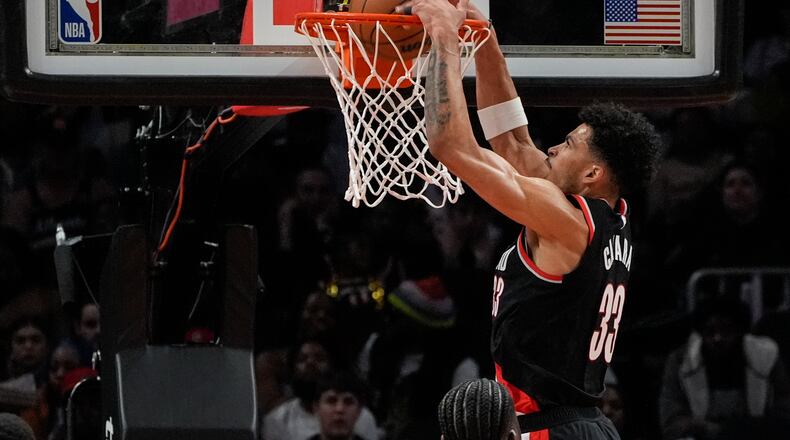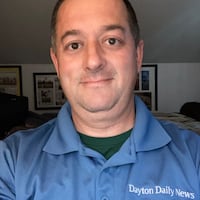Camara appeared in 70 games, averaging 7.5 points and 4.9 rebounds in 24.8 minutes per game. He ranked third on the team in games started (49). He missed the last eight games after fracturing his left rib and lacerating his kidney.
In April, Camara won the Maurice Lucas Award, which is given annually to the Portland player who “best represents the indomitable spirit” of the late Blazers legend.
“Toumani embodies high character and unabashed toughness on and off the court that Rip City has come to love,” general manager Joe Cronin said in a statement. “We are proud to name Toumani the recipient of the Maurice Lucas Award this season as he has only just begun to make his bigger-than-life impact on the Portland community.”
Even after the acquisition of Camara, who Portland acquired in a trade with the Phoenix Suns in September, the Blazers suffered their third losing season in a row and had the worst record (21-61) in the Western Conference. It was the franchise’s worst season since 2005-06 when it had the same record.
Camara talked about his first season with reporters in April in a video the Blazers shared on YouTube. Here’s an edited transcript of the conversation.
Credit: AP
Credit: AP
Q: Just in general, how do you feel about your rookie season, particularly maybe in contrast to maybe what your expectations were going into it?
A: A lot of ups and downs. I think one of the things I like the most about the game of basketball is winning games, so it was a really tough year. But I felt like I was able to learn so much being able to be on the court a lot as a rookie, which I didn’t expect.
Q: What does it mean to you that you were able to make such a large impact in your first year?
A: I think it’s something that I never expected, especially not knowing if I was going to get drafted. I’m just very grateful I was able to have an impact on the team and learn so much as a player. It was an amazing year for me from a growing aspect.
Q: How disappointing was it for you in the final couple weeks of the season when they were giving all the younger guys a lot of extended run and you had that injury and weren’t able to be out there with them?
A: It’s hard, especially because one of my goals was to be able to play 82 games. I missed three games before my injury. I was just trying to play as much as I could because I love the game so much, and I knew I was going to have more opportunities toward the end of the year. But life works in mysterious ways. Everything happens for a reason. I’m just grateful that I’m in the NBA, and I know my injuries are not too bad. I’ll be back next year and be in a good spot.
Q: Why was one of your goals to play 82 games?
A: I’m a competitor. I love being on the court. I hate sitting on the sideline and having to watch my teammates and my boys play. It’s very important for me to be able to give 100% and participate as much as I can.
Q: What are some of the things you’re going to look to improve this offseason?
A: I think my shooting, finishing and ball handling are probably the main three things that I want to improve on. Keep on working on all the aspects with my physical abilities. Also my defense. Read the screens better. Watch more film. Just keep on getting better every day.
Q: How important was it for you to kind of embrace the city? Obviously, the team gave you the Maurice Lucas award.
A: It means a lot. I wasn’t ready for this. I didn’t know if I was going to get drafted or if I was going to be in a situation where I was going to be able to play. Being able to have that support and have all that work that I’ve been putting in recognized, it means a lot to me. I can’t complain. I feel like I’m in a great place. My whole family, my partner, everybody’s feeling good here in Portland. And I’m feeling good here in Portland.
Q: There’s a lot of young forwards on this team. What does that competition feel like between you guys?
A: It’s funny because I don’t even feel any competition. There was a lot of respect between each and every one of us. It’s motivation. You control what you can control. If you’re not playing, there’s something that you could do better. If you are playing, there’s something that are doing good. We’re competing, of course, on and off the court, but it’s not a toxic competition. It’s really friendly and really respectful.
Q: What was it like in terms of that process of playing and then not playing as much and then getting back in the lineup?
A: It was really hard, I think for everybody, especially with the number of injuries that we had and the number of changes that we had to make almost every game. I think I was getting lost a little bit. I’m still a first-year. I’m a competitor. So of course I want to be on the court as much as I can, but I need to remember how much I have to learn still.
Q: What did you figure out about not only where you are on this team but what your role is in the NBA?
A: I think right now who I am is a defense-first person. I’m trying to still find myself as an offensive guy. I feel like throughout my whole career in college, I have been 4 or 5 man. It was my first year playing on the wing. I’m able to put the ball on the ground a little bit more. I’m not playing back to the basket. There’s a lot to learn, a lot of new habits that I have to have. I think my role will keep on growing. I think my shooting is going to get better. I think my ball handling is going to get better. I don’t want to put any limits on myself.
Q: How’d you enjoy earning that reputation of someone that brings toughness to the team as a defensive stopper?
A: I love it. That’s that’s all I’m about. I’m all about effort and trying to make winning plays and try to help the team. If the team needs me to score, if the team needs me to guard the toughest player, I’m willing to do that. I have a lot more things to prove. But it’s very humbling and exciting that people can see that.
About the Author


